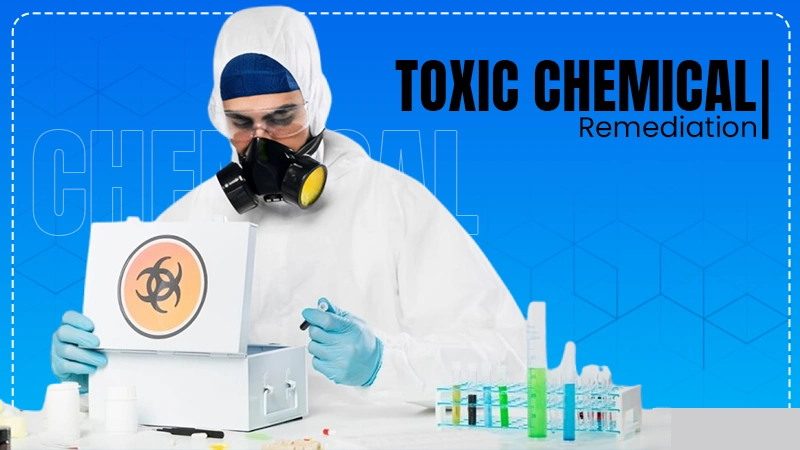
The field of toxic chemical cleanup has quickly become one of the most crucial and sought-after career paths today. Environmental remediation services are projected to grow at a CAGR of 8.4% from 2021 to 2027. Eventually, this growth will push the market size to about $163.4 billion by 2027.
Increased industrialization, global pollution, and stricter environmental regulations are driving this expansion. Consequently, there is a greater demand for proficient professionals to manage hazardous chemicals in the environment.
For those interested in environmental science, a career in toxic chemical remediation promises job stability and meaningful impact. With the proliferation of online education, obtaining the necessary qualifications has become more convenient than ever. This article explores why choosing a career in toxic chemical remediation is beneficial today. It will also look at the specific academic programs that can help you succeed in this field.
Growing Demand for Environmental Remediation Experts
The need for environmental cleanup, particularly in removing toxic chemicals, stems from recognizing the long-term harm caused by pollution. Following prominent cases like the PFAS lawsuit, governments worldwide are enhancing regulations on industrial waste disposal.
They are also improving the management of hazardous substances and conducting environmental impact assessments. This shift is particularly noticeable in the case of chemicals like PFAS (per- and polyfluoroalkyl substances), which have polluted water sources.
Apart from PFAS, challenges like contamination from heavy metals in mining, pesticide pollution, and oil spills are evident. These issues necessitate the supervision of experienced professionals in remediation projects. As industries expand, the need for specialists who can mitigate environmental damage is on the rise. This trend establishes toxic chemical remediation as a resilient career choice for both the present and future.
The Importance of Specialized Education
Experts in the field of harmful chemical remediation are in high demand. However, it requires specialized expertise to address intricate environmental issues. Obtaining the right degree provides the technical skills and scientific knowledge needed to successfully oversee environmental remediation projects. Certain degrees are particularly valuable and pertinent for pursuing a career in this field.
Environmental Science Degree
A Bachelor’s or Master’s degree in Environmental Science provides an understanding of ecosystems, pollution, and environmental management. This degree is valuable as it encompasses topics from soil science to environmental policy, offering both scientific and regulatory knowledge.
For those interested in toxic chemical remediation, relevant courses cover environmental chemistry, soil and water contamination, and hazardous waste management. An online Environmental Science degree also expands career opportunities in consulting firms, government agencies, and NGOs involved in pollution control.
Public Health Degree with Environmental Health Focus
A degree in Public Health integrates knowledge of toxicology, epidemiology, and public health policies. Such expertise is essential for addressing health hazards associated with chemical contaminants.
According to TorHoerman Law, PFAS contamination is an undeniably major public health concern. Professionals in Public Health play a vital role in evaluating the human effects of chemical exposure. As a result, the degree is extremely valuable for projects aimed at minimizing health risks.
Numerous institutions provide flexible, online Public Health programs, allowing students to specialize in environmental risk assessment and hazardous material management. This directly corresponds to a career in the cleanup of toxic chemicals.
Chemistry Degree with Toxicology or Environmental Chemistry Focus
Obtaining a degree in chemistry, particularly with a specialization in toxicology or environmental chemistry, can be extremely advantageous. This educational background helps individuals understand the behavior of chemicals in the environment and their degradation process. Additionally, such a program teaches the most effective methods to mitigate their adverse impacts.
Participating in programs that include studies in toxicology, chemical decomposition, and environmental risk evaluation can prepare you for specialized positions. These roles may involve laboratory analysis or contamination assessment in chemical remediation.
Now is the Best Time to Enter This Field
The current urgent environmental situation has heightened the importance of addressing toxic chemicals more than ever, says the EPA. The combination of climate change, escalating pollution, and stricter environmental regulations contribute to the growing demand for specialists in remediation. Moreover, this field presents prospects for expansion as industries seek to adhere to regulations and minimize their environmental impact.
In addition, numerous countries are now investing in extensive remediation initiatives, particularly for polluted water and soil. Therefore, this leads to abundant employment opportunities in industrial consulting and regulatory compliance.
FAQs
Ans: The process of toxic chemical remediation involves cleaning up harmful chemicals in the environment. Contaminated soil, water, and air are the main focus areas. This is done to safeguard human health and restore ecosystems impacted by industrial pollutants, hazardous waste, or accidental chemical spills.
Ans: Essential skills include a deep understanding of environmental regulations and knowledge of chemical behaviors in the environment. Further, they involve the ability to assess risks and technical proficiency in designing and managing remediation systems. Strong communication and project management abilities are also vital when collaborating with teams or engaging with regulatory bodies.
Ans: Individuals in toxic chemical remediation can pursue various roles, including environmental consultants, engineers, project managers, and public health officers. Environmental toxicologists also play a critical role in studying the effects of toxic chemicals on organisms and ecosystems through laboratory experiments. Moreover, employment opportunities can be found in the public sector, private consulting firms, waste management companies, and other related sectors.
Toxic chemical remediation is not just a career—it’s a chance to be on the front lines of environmental protection. With the right degree, you can become a part of the effort to tackle pollution, restore ecosystems, and protect public health. Now is the perfect time to consider building a rewarding career that makes a real impact on the world